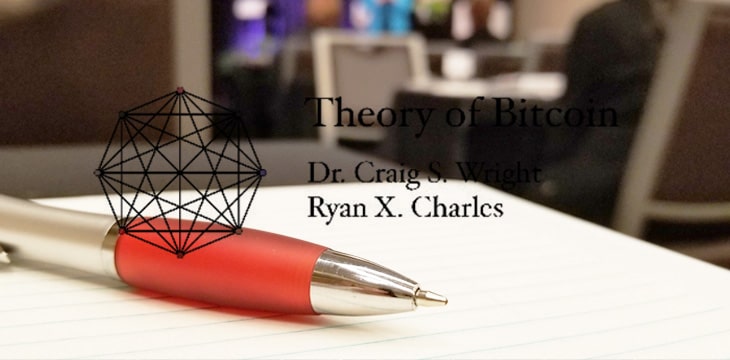How do you learn more about Bitcoin without actually talking about Bitcoin? Find out exactly how by watching the latest “Theory of Bitcoin” episode with its creator, Dr. Craig S. Wright and Money Button’s Ryan X. Charles. This week’s topic is “Economics, Information, Religion, Work, and Goggins”—all of which serve in their own way to help people understand why.
A central theme to this discussion is the importance of learning and education, and the right to have them. As you’ll find out, it’s more about why these topics are important than details of the topics themselves. Since all help form the background to Bitcoin’s existence and purpose, this episode is probably a “meta-meta” chat about the… whys behind the whys of Bitcoin.
What does that mean?
We could explain, but it’s better to watch the episode and make your own judgment. Charles kicks things off by explaining that he sees himself as a student, not (in this case) of Bitcoin but of Dr. Wright himself.
Craig Wright, in case you’re unfamiliar with is background, is an extremely driven person. And his pursuit is to learn as much as he possibly can in the time he has on earth—and in doing so, try to apply that knowledge to create a better world. History tells us that whole cities and civilizations have been destroyed by attempts to create better worlds, which is why it’s important to understand everything as much as you can: a deficiency in history, philosophy, economics, science, religion, psychology and technology could be the factor that ruins everything else.
For the record, Dr. Wright once had a job gutting chickens. And yes, you can even learn a lot from doing that. Charles, for his part, tries to understand the drive behind Wright’s goal of learning as much as possible, and how the variety of topics Wright has studied (and continues to study) has led to where we are now.
One should never stop learning, Wright says, and more importantly, don’t forget anything. “I don’t ever have a moment where I can stop and forget.” He’s actually against taking summer holidays, because the break only facilitates forgetting. There’s a discussion later in the episode about other extremely driven people (which is how David Goggins got in the title) and how they come to be that way.
“The more stress I have in my life, the happier I am. I know that sounds perverse,” Wright notes.
Economics and socialism
The two start by mentioning economics, though as Wright explains, economics is everything. That’s because everything we do requires energy, input and output, and for that everyone needs resources. Luckily, resources are not as scarce as some think, but acquiring them requires energy, and energy has costs. For example, there’s more gold under the ocean than there is under dry land, but the costs to mine it would be too great. The same goes for other resources too, hence everything is economics.
Charles then asks about the relationship between energy, information and knowledge, which sets the tone for the rest of the discussion. Knowledge is an Archimedes’ Lever, Dr. Wright says. It allows us to do more with less, to improve the tools and technologies we use, and to perform all actions with greater efficiency.
Dr. Wright, whose philosophy defies exact categorization, leans strongly towards humanism, individualism, capitalism (in the classic liberal sense), and the need for order. These factors must be present to have true freedom and for humanity to prosper. Needless to say, Wright is not a fan of socialism—and neither, many of us thought, was anyone else. Until recently, that is, when socialism (or something masquerading as it) began to make a big comeback.
Socialists love to redefine words before arguing their points, which makes their arguments sound more plausible. This is a facet of the current “revolution” taking place in parts of the USA and other countries. However behind the façade of creating a utopia, socialism is inherently destructive. Wright refers to today’s Antifa and Black Lives Matter “movements” as doing just that—they are anti-culture, destroying history and tradition but not replacing them with anything.
The problem with socialism (apart from not recognizing the price mechanism) is that it drags everything down to the lowest common denominator in its pursuit of the “equality” myth. As Wright has said in this series before, equality is neither achievable nor desirable. Socialism impoverishes the rich, devalues work and achievement, and in doing so removes the motivation to strive for anything. And yes, there’s a reference to Vonnegut’s “Harrison Bergeron,” a story that demonstrates that lesson with a sledgehammer.
That said, money is not the only motivator. People are driven by pride, status and power as much as money. Drug dealing may pay less than a McDonald’s wage, but it brings with it more power and (to some) status.
Some may sense a certain Protestant work ethic in Dr. Wright’s life, and this leads to a discussion on religion and its role in culture. Wright has been both a Catholic and a Protestant, so is in a good position to compare the two—which he does. He also goes into depth about the history of the two outlooks and how they have themselves been corrupted over the years.
But even atheists have religions, they agree. Dr. Wright says America itself is a religion, whatever the symbols people use to define it. America stood for freedom, the right to pursue happiness, and the promise of an education, all things it is in danger of losing if people don’t start believing in it again and the mindless destruction continues.
“The world is anarchic. There are small pockets of order … if you don’t put effort in, things decay.” The rule of law, and having adequate power to enforce it, are essential factors here on a local and global scale.
Knowing all this may help you sleep better
As we said earlier, the “Theory of Bitcoin” series isn’t necessarily for people wanting to learn the Bitcoin basics. There is plenty of other material for that anyway. However, understanding the philosophies and motivations of the man who created Bitcoin will help you know it better once you gain that basic knowledge.
Bitcoin can be confusing and daunting even to those with years of experience, and there have been many nights of lost sleep and existential crises over where it’s all leading and what it’s all for. Watching this series can reduce some of those moments, so continue on with that education.
To watch previous episodes of the Theory of Bitcoin, check the Theory of Bitcoin YouTube playlist here.
New to blockchain? Check out CoinGeek’s Blockchain for Beginners section, the ultimate resource guide to learn more about blockchain technology.









